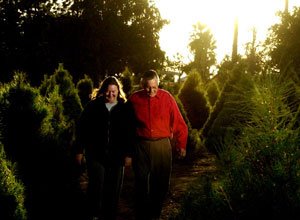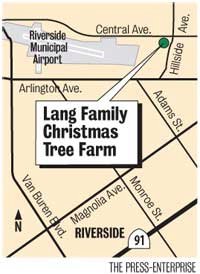The farm in the paper
The tree farm got a major article in our local newspaper. For those who don't want to register just for this article, and maybe for posterity's sake, here's a cache of the article. You can thank me later.
Uprooted tradition
Land value grows greater than profits at tree farm
07:46 AM PST on Thursday, December 22, 2005
By SHIRIN PARSAVAND / The Press-Enterprise
Christmas-tree farms
California: 543
Riverside County: 20
San Bernardino County: 24
Source: 2002 Census of Agriculture, National Agricultural Statistics Service (USDA)
RIVERSIDE - Stan Lang bought 4 acres on Central and Hillside avenues in Riverside about 30 years ago with only a vague idea of what he would do with it, other than have more room for his family.
An agricultural expert told the Langs they could turn a tidy profit on a Christmas tree farm, so that's what they decided to do. Lang Family Christmas Tree Farm opened in 1976 and became an annual tradition for many customers.
That tradition could be coming to an end soon.
Lang said he has begun to entertain offers for the 12 acres he now owns after adding to his original purchase.
"There's a lot of people wanting land that's in the city limits, big chunks of land like this," said Lang, who is 76 and still lives in a house on the farm.
Lang and his children said it has grown harder to turn a profit because of rising water and staff costs. Lang also blames the popularity of artificial trees.

Ed Crisostomo / The Press-Enterprise
Donita Lang Smith, left, and her father, Stan Lang, take a stroll at the Lang Family Christmas Tree Farm in Riverside. Stan Lang, who lives on the farm, said, "There's a lot of people wanting land that's in city limits, big chunks of land like this."
Nationally, about 9 million artificial trees were sold in 2004, compared to 27 million real trees, according to the National Christmas Tree Association. About one-fourth of the real trees came from tree farms.
And since people typically reuse artificial trees, it takes them out of the Christmas tree purchasing pool -- for a few years anyway.
"They'll have it, but they'll get tired of it," Sam Minturn, executive director of the California Christmas Tree Association, said of an artificial tree.
"Some of them are coming back to the tree farms, even though they have that artificial tree sitting in the garage or the attic."
Lost Leases
Minturn said the number of tree farms in the state is holding steady, but not in Southern California. Many of the region's tree farms are located on easements under power lines, and some are losing their leases because businesses can pay more for other uses, Minturn said.
That's what happened to Dan Coelho, owner of the Fontana Pines tree farm. He moved to Fontana eight years ago after 22 years in Lakewood.
He moved after losing his lease with Southern California Edison, which in turn rented the land for RV storage, Coelho said.
Coelho said he sells around 2,000 trees each year at his Fontana tree farm, also leased from Southern California Edison. He hopes to keep it going, but his lease is only in force for three years at a time.
Sales remain strong at Live Oak Canyon Christmas Tree Farm in Redlands, where Gregg Palmer has leased land from relatives for 23 years. But Palmer said gas and employee costs are eating up a higher share of the profits.
He said the landowners might eventually want to sell or develop the land, though he expects to remain open for at least a few more years.

Southern California 'Curse'
The Lang Tree Farm is not on the market, but the Lang family has received offers.
The city recently rezoned the land, which is near the Riverside Municipal Airport, to allow light manufacturing or offices. One of these uses is likely to replace the trees, which at the farm's peak numbered 17,000.
"It's the curse of Southern California. Land is getting too expensive and too valuable," said Lang's son, Drew Lang.
The family has been telling their regulars the farm might not be there next year.
"So many people have been coming here for years with their kids. We're always hearing, 'I've been coming here since I was 4 years old,' " said Stan Lang's daughter, Donita Lang Smith, who was married on the property.
Bonnie Nance, who lives nearby and bought a tree at the farm Sunday, said she'd be disappointed to see the farm go.
"I'd rather see trees here than see an industrial place stuck in here, and more buildings," said Nance, 43.
Stan Lang has a hard time with the idea, too, though it has grown difficult for him to run the place on his own.
As he walked amid the Monterey pines, he watched two boys, 9 and 11 years old, examine the trees while their mother pushed another young son in a stroller.
"This is what I like, a little family like this, so one of the kids can saw the tree down," Lang said.
"I hate to give it up. Land is getting so valuable you don't know what to do," he said.
Three of Lang's five children and their spouses are pitching in for free this year to help run the farm.
Some of the grandchildren are among the employees this season, which started the day after Thanksgiving and will last through Christmas Eve.
Donita Lang Smith said Lang's children took the time to help because they wanted their father to have the farm at least one more year.
"You can't really stop change. This whole area just keeps growing. It's kind of nice that there's something like this in the middle of town, but it's not going to last forever," she said.
Uprooted tradition
Land value grows greater than profits at tree farm
07:46 AM PST on Thursday, December 22, 2005
By SHIRIN PARSAVAND / The Press-Enterprise
Christmas-tree farms
California: 543
Riverside County: 20
San Bernardino County: 24
Source: 2002 Census of Agriculture, National Agricultural Statistics Service (USDA)
RIVERSIDE - Stan Lang bought 4 acres on Central and Hillside avenues in Riverside about 30 years ago with only a vague idea of what he would do with it, other than have more room for his family.
An agricultural expert told the Langs they could turn a tidy profit on a Christmas tree farm, so that's what they decided to do. Lang Family Christmas Tree Farm opened in 1976 and became an annual tradition for many customers.
That tradition could be coming to an end soon.
Lang said he has begun to entertain offers for the 12 acres he now owns after adding to his original purchase.
"There's a lot of people wanting land that's in the city limits, big chunks of land like this," said Lang, who is 76 and still lives in a house on the farm.
Lang and his children said it has grown harder to turn a profit because of rising water and staff costs. Lang also blames the popularity of artificial trees.

Ed Crisostomo / The Press-Enterprise
Donita Lang Smith, left, and her father, Stan Lang, take a stroll at the Lang Family Christmas Tree Farm in Riverside. Stan Lang, who lives on the farm, said, "There's a lot of people wanting land that's in city limits, big chunks of land like this."
Nationally, about 9 million artificial trees were sold in 2004, compared to 27 million real trees, according to the National Christmas Tree Association. About one-fourth of the real trees came from tree farms.
And since people typically reuse artificial trees, it takes them out of the Christmas tree purchasing pool -- for a few years anyway.
"They'll have it, but they'll get tired of it," Sam Minturn, executive director of the California Christmas Tree Association, said of an artificial tree.
"Some of them are coming back to the tree farms, even though they have that artificial tree sitting in the garage or the attic."
Lost Leases
Minturn said the number of tree farms in the state is holding steady, but not in Southern California. Many of the region's tree farms are located on easements under power lines, and some are losing their leases because businesses can pay more for other uses, Minturn said.
That's what happened to Dan Coelho, owner of the Fontana Pines tree farm. He moved to Fontana eight years ago after 22 years in Lakewood.
He moved after losing his lease with Southern California Edison, which in turn rented the land for RV storage, Coelho said.
Coelho said he sells around 2,000 trees each year at his Fontana tree farm, also leased from Southern California Edison. He hopes to keep it going, but his lease is only in force for three years at a time.
Sales remain strong at Live Oak Canyon Christmas Tree Farm in Redlands, where Gregg Palmer has leased land from relatives for 23 years. But Palmer said gas and employee costs are eating up a higher share of the profits.
He said the landowners might eventually want to sell or develop the land, though he expects to remain open for at least a few more years.

Southern California 'Curse'
The Lang Tree Farm is not on the market, but the Lang family has received offers.
The city recently rezoned the land, which is near the Riverside Municipal Airport, to allow light manufacturing or offices. One of these uses is likely to replace the trees, which at the farm's peak numbered 17,000.
"It's the curse of Southern California. Land is getting too expensive and too valuable," said Lang's son, Drew Lang.
The family has been telling their regulars the farm might not be there next year.
"So many people have been coming here for years with their kids. We're always hearing, 'I've been coming here since I was 4 years old,' " said Stan Lang's daughter, Donita Lang Smith, who was married on the property.
Bonnie Nance, who lives nearby and bought a tree at the farm Sunday, said she'd be disappointed to see the farm go.
"I'd rather see trees here than see an industrial place stuck in here, and more buildings," said Nance, 43.
Stan Lang has a hard time with the idea, too, though it has grown difficult for him to run the place on his own.
As he walked amid the Monterey pines, he watched two boys, 9 and 11 years old, examine the trees while their mother pushed another young son in a stroller.
"This is what I like, a little family like this, so one of the kids can saw the tree down," Lang said.
"I hate to give it up. Land is getting so valuable you don't know what to do," he said.
Three of Lang's five children and their spouses are pitching in for free this year to help run the farm.
Some of the grandchildren are among the employees this season, which started the day after Thanksgiving and will last through Christmas Eve.
Donita Lang Smith said Lang's children took the time to help because they wanted their father to have the farm at least one more year.
"You can't really stop change. This whole area just keeps growing. It's kind of nice that there's something like this in the middle of town, but it's not going to last forever," she said.


1 Comments:
That's a nic picture of Donita and Stan. The kind you want to keep for the good memories.
Your pisture is nice too. You're very photogenic.
I'd like to put a picture up of myself, but I'm not sure how.
Post a Comment
<< Home